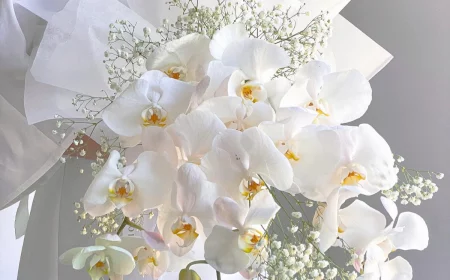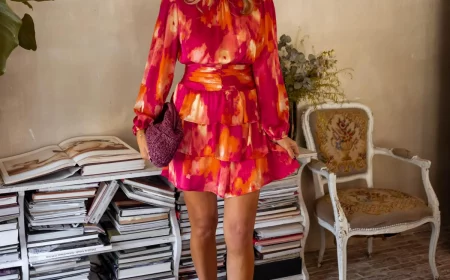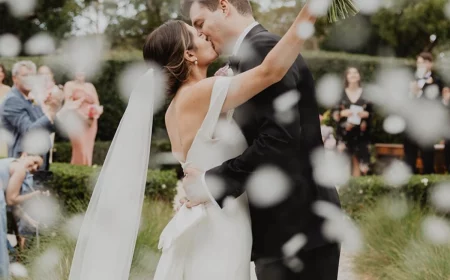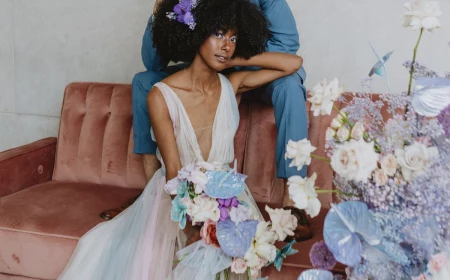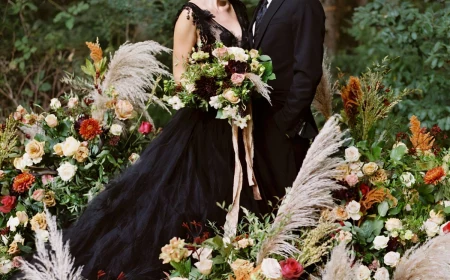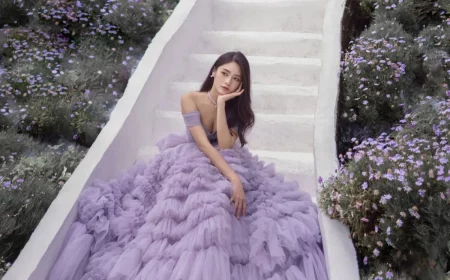The Honest Truth About Long-Sleeve Wedding Dresses: Fit, Fabric, and avoiding a disaster
I’ve been in the world of bridal gowns for a long, long time, and I’ve seen styles pop up and fade away. But the long-sleeve wedding dress? It’s forever. It’s more than just a trend; it’s a choice that speaks to a certain kind of grace and elegance. I’ve helped brides find the perfect sleeves for a cozy winter ceremony, for a traditional service in a breathtaking cathedral, and sometimes, just for the sheer drama of it all. And every single time, a gown’s success boils down to two things: the right fabric and a flawless fit. Honestly, getting this right is the difference between a dress that feels like a second skin and one you’re wrestling with on the dance floor.
In this article
So many brides come into the studio with a picture they love, but they don’t always see the architecture behind the beauty. A sleeve isn’t just a piece of fabric you sew onto a bodice. It’s an engineered part of the dress that dictates how you move, how comfortable you are, and the entire shape you create. This guide is basically the conversation I have with every single client. It’s about looking past the photo to understand what makes a long-sleeve dress truly work.

First Things First: The Bodice Is Everything
Before we even whisper the word “sleeve,” we have to talk about the bodice. A sleeve can’t do its job without proper support. It’s like building a house—you wouldn’t dream of putting up the walls before you have a solid foundation, right? The bodice is the foundation for your sleeves.
A well-made bodice, whether it has boning, an inner corset, or just incredibly smart seams, holds the weight of the sleeve and keeps it perfectly placed on your shoulder. If the bodice is flimsy or doesn’t fit you correctly, the sleeves will inevitably pull, sag, or make you feel like you can’t lift your arms. During a fitting, one of the first things the pros check is the armscye (that’s the technical term for the armhole). Is it cut properly? Does it lay flat against your body without gaping or pinching? If that armhole is off, no amount of fiddling with the sleeve itself will fix the problem.

This is even more critical for strapless or off-the-shoulder dresses where you’re adding sleeves later. For those, the structure has to come entirely from the torso. A fantastic little trick is to sew in an internal waist stay—it’s a sturdy ribbon-like belt on the inside of the dress that anchors the whole thing to the smallest part of your waist. You’ll never see it, but it’s the secret weapon that stops the dress from sliding down and taking the sleeves with it.
Let’s Talk Fabric: A Material Deep Dive
The personality of a sleeve is almost entirely decided by its fabric. You might say you want a “soft, romantic sleeve,” but that can mean a dozen different things. Understanding how different materials look, feel, and move is key to turning your vision into reality. This is why bridal designers are so picky about their suppliers; they know exactly how a certain fabric will stretch, catch the light, and feel against your skin after eight hours of wear.

Lace: The Romantic Classic
Oh, lace. It’s not just one thing! The type of lace you choose completely defines the sleeve.
For an ethereal, delicate vibe, there’s Chantilly Lace. This is one of the lightest, most web-like laces out there. It’s perfect for that sheer, “whisper on the skin” feeling. Because it’s so fine, it’s also quite fragile, so it needs to be handled with care. Its delicate nature also means it’s usually in a higher price bracket ($$$).
If you want more definition, look at Alençon Lace. You can spot Alençon by the fine cord that outlines its floral patterns. This cording gives it more texture and weight than Chantilly, making the designs pop beautifully on an illusion sleeve. It has a bit more structure, making it a solid mid-range choice in terms of both durability and cost ($$).
For a bold, graphic statement, you want Guipure Lace. This is the heaviest of the bunch, with patterns connected by braids instead of a net background. A Guipure sleeve isn’t subtle; it’s textured and strong. Because of its weight, it demands a very supportive bodice and is often used for bell sleeves or simpler, straight cuts.

Illusion Tulle: The “Second Skin” Effect
That incredible “tattoo lace” look you see everywhere? That’s all thanks to illusion tulle. It’s an ultra-fine, soft netting made to blend right into your skin tone. And here’s the crucial part: getting the color match right. Any good studio will have dozens of shades, because a bad match completely ruins the magic. A quality tulle will feel soft and have a tiny bit of stretch for movement. A cheaper version will often feel scratchy, especially at the seams. Quick tip: always rub the fabric on the inside of your wrist. If it feels rough there, imagine it under your arm all day.
By the way, when you see lace appliqués on a tulle sleeve, you’re looking at hours and hours of painstaking handwork. Each little flower or swirl is cut out and strategically placed to curve around the elbow and flatter the arm. This is where a big chunk of a gown’s cost comes from!

Crepe: The Modern, Chic Choice
Crepe is a smooth, woven fabric with a gorgeous matte finish. A crepe sleeve is opaque and creates an incredibly chic, minimalist look. Its beauty is all in the drape—a high-quality crepe has a satisfying weight that lets it hang perfectly straight. But heads up, it’s a very unforgiving fabric. Every single pucker or pull will show, so the sleeve pattern has to be cut with absolute precision. This is a job for a true expert. In terms of cost, it’s often more moderate than intricate lace ($$).
Organza, Chiffon, & Georgette: The Flowy Trio
These are all lightweight and sheer, but they have very different personalities.
Organza is your go-to for drama and volume. It’s crisp with a slight sheen and holds its shape, making it ideal for big, puffy bishop sleeves or a structured shoulder. It’s often one of the more budget-friendly options for adding sheer volume ($).
Chiffon is the softest and most fluid. It has zero body of its own, so it just floats and drapes beautifully. A chiffon sleeve is pure romance, but it’s very delicate and can snag easily.
Georgette is like chiffon’s slightly heavier, more durable cousin. It drapes in a similar way but is a little more opaque and has a crinkled texture, offering a soft look with a bit more resilience.

Pro Secrets for a Fit That Feels Custom-Made
Getting a sleeve to fit perfectly is more than just measuring your arm’s length. It’s an art form, and this is where a seamstress’s experience really shines.
The Art of Adding Sleeves
So, you bought a strapless dress off the rack and now you want to add sleeves. Can it be done? Yes, but it’s a complex process. It’s not just a matter of sewing on two tubes of fabric. A seamstress has to open up the bodice to anchor the sleeve securely, which can be like performing surgery if the dress has a lot of beading or lace.
You’re probably wondering, what does that even cost? Be prepared: adding custom lace sleeves to a gown can range anywhere from $400 to over $1,000, depending on the lace and complexity. A simpler, well-made crepe sleeve might be closer to the $300-$500 range. And this kind of major work takes time. You should book your specialist at least 3-4 months before your wedding, especially during the busy season (spring and fall).

Oh yeah, and what about those cool detachable sleeves? They often connect with a row of tiny, invisible snaps or clear buttons hidden right along the armhole seam, making them easy to pop on for the ceremony and off for the reception.
The Non-Negotiable Muslin Fitting
For any custom-made sleeve, the pros will always create a test version out of muslin first. This is called a toile. It lets them perfect the fit—checking the shoulder, the angle of the arm, and the room at the elbow—without ever touching your expensive final fabric. It’s a critical step that saves so much stress and money.
The Hug Test: A Simple Action Step
The number one complaint about long sleeves is restricted movement. You should be able to hug your family and raise your glass for a toast! So, here’s a little homework for you.
Try This Now: The next time you try on any long-sleeve top or jacket, lift your arms straight above your head, then give yourself a big hug. See where it pulls across your back or feels tight on your biceps? Now you know exactly what to test for when you’re trying on wedding gowns!

For very fitted sleeves, especially in non-stretch fabrics like crepe, a great seamstress can add a hidden underarm gusset—a tiny diamond-shaped piece of fabric that gives you a much better range of motion. It’s a classic tailoring trick that’s worth its weight in gold.
Finding Your Expert & Asking the Right Questions
I can’t say this loudly enough: do not take an expensive wedding gown to your neighborhood dry cleaner for major alterations. Bridal sewing is a unique specialty.
To find the right person, get specific with your search. Google terms like “bridal alterations specialist” or “custom wedding dress seamstress near me.” When you find someone, ask to see a portfolio of their work, especially on dresses with similar fabrics or silhouettes to yours.
Here are some great questions to ask them:
- Have you worked with this specific fabric (lace, crepe, etc.) before?
- Can we plan for a muslin fitting for the sleeves first?
- What is your estimated timeline for these alterations?
- Can you add an underarm gusset if I’m concerned about movement?
- How will you handle the finished edge of the sleeve? (Especially important for scalloped lace!)

A Serious Word on Safety
Okay, let’s have a serious chat for a second. Flowing sleeves made of organza, chiffon, or tulle can be highly flammable. I know of a terrifying incident where a bride’s sleeve swept across a table and brushed against a candle. It went up in a flash. Please, please be incredibly mindful of candles on your tables or during your ceremony. Know where your sleeves are at all times. It’s a small thing that can prevent a disaster.
Trust the Process
Finding the perfect long-sleeve dress is a journey. It takes patience and a little bit of faith in the experts helping you. Be open about your budget, how you want to feel, and what you envision. When the fabric is right and the fit is perfect, you won’t just be wearing a dress. You’ll be wearing something that feels like it was made just for you.

Inspiration Gallery





Important point: The wrist finish defines the sleeve’s elegance. A sleeve ending precisely at the wrist bone is the gold standard. Too long, and it appears ill-fitting; too short, and it can look unfinished. For a bespoke touch, consider adding a row of delicate silk-covered buttons or a fine lace trim at the cuff.




Can I even lift my arms for the bouquet toss?
This is a legitimate fear! During your fitting, don’t just stand still. Practice raising your arms, hugging a friend, and even doing a little dance. A well-constructed sleeve, sometimes incorporating a hidden gusset (a small, diamond-shaped fabric insert under the arm), can provide surprising freedom of movement without compromising the silhouette.





Chantilly Lace: Feather-light, with a fine net background and delicate floral patterns. It’s incredibly romantic and drapes beautifully, ideal for a soft, ethereal look often seen in designs by Claire Pettibone.
Alençon Lace: A needlepoint lace with a heavier feel, known for its motifs outlined with a distinct cord (cordonnet). It offers more structure and a classic, formal appearance, perfect for a traditional gown.
Your choice of lace is a primary factor in defining the dress’s personality.




The illusion sleeve is a modern marvel. Using a sheer, skin-toned tulle as a base allows for intricate lace or beading to appear as if it’s floating directly on the skin. It offers the elegance of a full sleeve with a tantalizing hint of allure, perfect for brides who want coverage without feeling completely bundled up. Designers like Berta are renowned masters of this breathtaking technique.





- Address any spills or makeup smudges on delicate sleeves with a professional cleaner who specializes in bridal gowns.
- Store the dress in a pH-neutral, archival-quality box, not a plastic bag which can trap moisture and cause yellowing over time.
- Use acid-free tissue paper to gently pad the sleeves and bodice to prevent sharp creases and preserve their shape.




Ever since Catherine, Duchess of Cambridge, walked down the aisle in her Alexander McQueen gown, searches for ‘long-sleeve wedding dresses’ have seen a consistent spike of over 80% around royal wedding events.





The Bishop sleeve is making a dramatic comeback, bringing a touch of 1970s bohemian romance to modern bridal wear. Characterized by its fullness from the shoulder down before gathering into a fitted cuff, it’s a statement of effortless style.
- It works beautifully with soft fabrics like silk chiffon or organza that capture movement and light.
- It perfectly balances a simple, unadorned skirt, like a clean crepe sheath.
- It adds a high-fashion, yet soft and feminine, feel to the overall look.




On average, adding intricate, custom-matched lace sleeves to a gown can increase its cost by 15-25%.
This is due to both the price of the fabric (especially high-quality French or Italian lace) and the highly skilled labor required to perfectly match patterns and seamlessly attach the sleeves. If you love the look but are on a tighter budget, consider gowns with simpler tulle sleeves or explore the versatility of detachable options.




- Creates a longer, more graceful line for the arms.
- Adds a touch of vintage, regal elegance.
- Provides a unique canvas for delicate embellishments or embroidery.
The secret? The Juliet sleeve. A distinct puff at the shoulder that tapers into a slim, fitted sleeve, it’s a romantic nod to Shakespearean heroines, beautifully updated for the modern bride.





Think about the feel, not just the look. A heavy, structured Mikado silk sleeve conveys power and formality, perfect for a grand, architectural venue. In contrast, a soft, unlined crepe de chine sleeve feels fluid and intimate, whispering of a relaxed garden or beachside ceremony. The fabric choice is your first step in setting the emotional tone for the day.




What about undergarments? Do they show through sheer sleeves?
This is where an expert seamstress is invaluable. For illusion sleeves, many high-end gowns from designers like Pronovias have built-in corsetry or cups, eliminating the need for a separate bra. If not, solutions like adhesive silicone cups or a low-back bustier in a nude shade are your best friends. The key is to have these items *at* your fitting to ensure a truly seamless look.





A common oversight is forgetting about your wedding season when choosing a sleeve fabric. A heavy brocade or velvet sleeve might be stunning for a December wedding but will become a heat trap for a ceremony in July. Conversely, a light-as-air illusion sleeve might not provide enough warmth for an outdoor autumn event. Always align your fabric choice with the climate of your wedding day.




Fitted Lace Sleeve: Timeless, elegant, and classic. This style hugs the arm, showcasing the intricate patterns of the lace. It’s the go-to for a traditional or royal-inspired look.
Detachable Puffed Sleeve: Modern, versatile, and fun. It offers two looks in one—dramatic for the ceremony, then strapless for the reception. Perfect for the fashion-forward bride.
Your choice reflects the story you want to tell: one of enduring tradition or one of contemporary transformation.





Take a cue from the icons. Grace Kelly’s 1956 wedding dress featured high-necked, long sleeves of delicate pearl-encrusted rose point lace. It was a statement of demure elegance that has influenced bridal fashion for over half a century, proving that full coverage can be more breathtakingly beautiful than any revealing design.




- Embroider your new initials or your wedding date near the cuff in a matching ivory or pale blue thread.
- Ask your seamstress to sew a tiny piece of lace from your mother’s or grandmother’s wedding dress onto the inside of the sleeve.
- Add a single, meaningful charm to one of the cuff buttons for a hidden personal touch.





The trend of ‘convertible’ dresses, often achieved with detachable sleeves, boleros, or overskirts, is growing. According to a recent bridal market report, nearly a quarter of modern brides are actively seeking gowns that can offer two looks in one.
This isn’t just about fashion; it’s about practicality and sustainability. By opting for detachable sleeves, you’re investing in a look you can transform for the reception and potentially wear again, maximizing the life of your gown beyond a single day.




- Feels buttery soft against the skin.
- Offers a clean, minimalist silhouette that photographs beautifully.
- Hugs curves without clinging uncomfortably, allowing for easy movement.
The secret? A high-quality stretch crepe. Unlike stiff satins, a gown from a brand like Sarah Seven or Alexandra Grecco using this material allows for comfort and fluidity while still looking utterly chic and polished.




Don’t fall in love with a sleeve style that clashes with your venue’s inherent vibe. A dramatic, bell-sleeved boho gown might feel out of place in a formal hotel ballroom, while a prim, fully buttoned lace sleeve could feel too rigid for a casual beach wedding. Let your setting inform your style, ensuring the dress feels harmonious with its surroundings.





Your final fitting is non-negotiable. Body weight can fluctuate in the stressful final weeks before a wedding, and even a slight change can dramatically alter how a fitted sleeve feels and looks. This final check, ideally a week or two before the event, ensures the sleeves are snug but not restrictive, allowing you to embrace your day with total confidence.




Are there stylish long-sleeve options that won’t break the bank?
Absolutely. Look for gowns where the sleeves are crafted from a more affordable material than the rest of the dress, such as simple, unadorned tulle or chiffon. Brands like Essense of Australia or Rebecca Ingram offer stunning long-sleeve designs that prioritize great construction and silhouette over expensive, all-over embellishments, providing that coveted look at a more accessible price point.





Pearl Embellishments: Scattered pearls on a sheer sleeve offer a modern take on classic glamour. They catch the light subtly and add texture without overwhelming the design. Think sophisticated, luminous, and timeless.
3D Floral Appliqués: These intricate, layered fabric flowers create depth and a fairytale-like romance. They are perfect for a garden or spring wedding, adding a touch of whimsical, tangible beauty to the sleeves.
Both are on-trend, but one leans toward classic elegance while the other embraces pure romance.




Famed bridal designer Monique Lhuillier once said, ‘The sleeve frames the upper body and can add so much personality to a gown, from demure to dramatic.’





For a winter wedding, consider a sleeve made of rich brocade or even a luxurious stretch velvet. These heavier fabrics not only provide a welcome touch of warmth but also lend an opulent, regal texture to your gown. They hold their shape beautifully, creating a structured silhouette perfect for a cozy, candlelit ceremony.




Point d’esprit is a lightweight tulle dotted with small, woven squares or dots. It offers a playful, whimsical alternative to plain tulle for sheer sleeves, adding texture and interest without the formality or cost of lace.



The way a sleeve attaches at the shoulder can completely change your look. A ‘set-in’ sleeve, sewn directly into the armscye like a traditional shirt, offers a classic, clean line. In contrast, a ‘raglan’ sleeve, which extends in one piece up to the collar, creates a sportier, more relaxed feel and can offer greater ease of movement.

